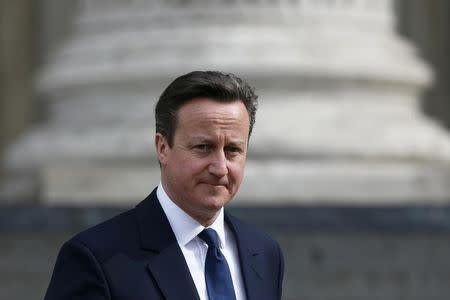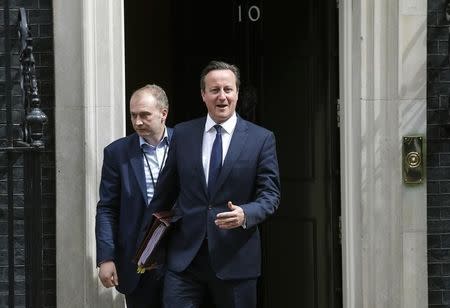Cameron to focus defence spending more on militant risk
LONDON (Reuters) - Britain should spend more of its defence budget on spy planes, drones and special forces to counter militants and Islamic State in Iraq and Syria, Prime Minister David Cameron will say on Monday. The government said last week it would meet NATO's defence spending pledge of 2 percent of gross domestic product (GDP) for the next five years, which would boost budgets to 47.7 billion pounds a year by 2020. "I have tasked the Defence and Security chiefs to look specifically at how we do more to counter the threat posed by IS and Islamist extremism," Cameron will say, according to excerpts from his speech. "This could include more spy planes, drones and special forces. In the last five years, I have seen just how vital these assets are in keeping us safe." Britain's defence chiefs will conclude a security review later this year. Separately, Cameron has invited Harriet Harman, the acting leader of the opposition Labour party, and its defence spokesman Vernon Coaker to a National Security Council meeting on Tuesday to discuss the threat posed by Islamic State. It would mark the first time an opposition leader has attended such a meeting since 2013, and comes as the government considers whether it should do more to counter Islamic State, including possible air strikes in Syria. "The Prime Minister thought it was important to ensure the leader of the opposition was fully briefed on the current situation," a spokesman said. Defence Secretary Michael Fallon said parliament would need to decide whether it was "logical" for the United States and other allies to be attacking Islamic State in Syria while Britain was fighting them in Iraq, but indicated any possible vote would not come until after the summer break. "That is a matter for the new parliament in due course, we are not planning an early vote on it," he told BBC radio. (Reporting by Paul Sandle and Kylie MacLellan; Editing by Ruth Pitchford)

 Yahoo News
Yahoo News 

